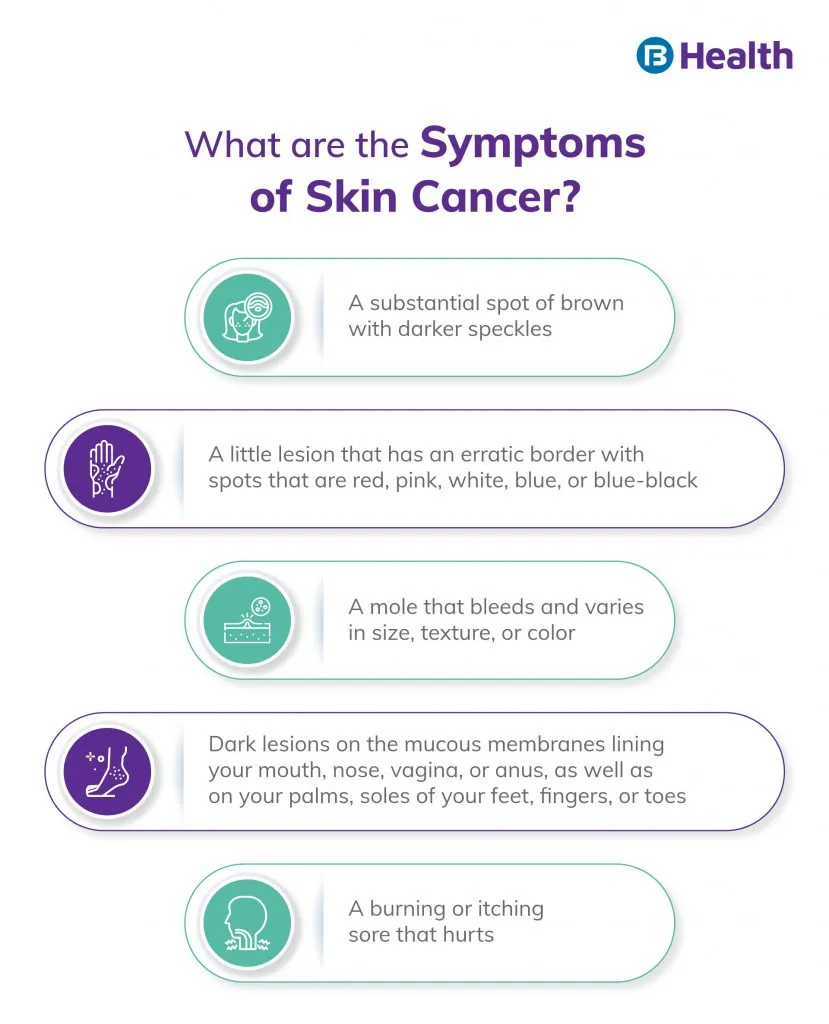Cancer | 7 min read
Suffering from Skin Cancer? Here's How to Deal with It!
Medically reviewed by
- Table of Content
Synopsis
Skin cancer is one of the most common forms of cancer and the most easily prevented. It is important to be aware of the different types, along with their associated symptoms, risk factors, and treatment options. Through awareness of the different skin cancer types and their associated risks and symptoms, we can better equip ourselves to detect and manage them.
Key Takeaways
- Skin cancer is one of the most common forms of cancer and poses a significant health risk
- It is important to understand the risk factors, symptoms, and ways to reduce the risk of skin cancer
- Early detection and treatment are key to managing skin cancer
What is Skin Cancer?
Skin cancer is a type of disease in which malignant (cancerous) cells form in the skin's tissues. It can occur on any body part, including the face, neck, arms, and legs. The most common types are basal cell carcinoma, squamous cell carcinoma, and melanoma.
Basal cell carcinoma is the more common type found in areas exposed to the sun, such as the face, neck, and hands. It is slow-growing cancer that rarely spreads.
Squamous cell carcinoma is a type that starts in the upper layers of the skin. It is most common in areas exposed to the sun, such as the face, ears, neck, and arms. Squamous cell carcinoma can spread to other body parts if left untreated.
Melanoma is a more aggressive type starting in the melanocytes, which are the cells that produce pigment in the skin. It can spread to other parts of the body if not treated.
Skin Cancer Causes
The main cause of abnormal cells is exposure to ultraviolet (UV) radiation from the sun or tanning beds. UV radiation damages the DNA in skin cells, leading to mutations that can cause skin cancer.Other risk factors for abnormal cells include having a family history of the disease, a weakened immune system, and a history of sunburns are some of the initial skin cancer symptoms. Genetic skin cancer causes can include pre-existing mutations in cells that make them more susceptible to becoming cancerous.
Exposure to certain chemicals can also increase one's risk. These include arsenic, coal tar, paraffin, and some types of oil.

Early Signs of Skin Cancer
Early signs can vary depending on the type:
- Melanoma the more serious type of abnormal cells, can present itself with a change in the size, shape, or color of a mole or other marks on the skin. It can also appear as a new mole or lesion
- Non-melanoma can appear as a lump, scab, or sore that does not heal. It may be an area of raised, red, scaly skin and can also present itself with a sore that bleeds and does not heal.
It is important to see a doctor if you notice any changes to your skin. Early detection and prompt treatment are the best defence against such diseases.
Common Symptoms of Skin Cancer
- Common symptoms to be aware of include changes in a mole's size, shape, or colour, a new mole that appears, or a sore that doesn't heal
- Other signs could be an itchy, scaly, or inflamed patch of skin, a bump that bleeds or crusts over, or an ulcer that doesn't heal.
- Abnormal cells can appear anywhere on the body, so it's important to regularly check your skin, especially if you are prone to sunburn or have a family history of this disease.
- If you notice any of these signs or any other changes in the appearance of your skin, it would be advisable to consult with a doctor.
- Skin Tumours vary in appearance. The American Cancer Society advises people to see a doctor if they observe a mark on their body that is different from previous marks they have, a wound that doesn't heal, a change in their skin's colour, or new swelling outside of a mole. [2]
Types of Skin Cancer
This disease can present itself in many different forms and is generally divided into two main types: non-melanoma and melanoma.
Non-melanoma is the more common type and is typically caused by prolonged exposure to ultraviolet radiation from the sun or tanning beds. This is further divided into two subtypes - basal cell carcinoma and squamous cell carcinoma.
- Basal cell carcinoma is the more common type and is usually found in areas exposed to the sun, such as the face, neck, and hands. It typically appears as small, flesh-colored bumps or nodules on the sun-exposed areas of the body.
- Squamous cell carcinoma is a type of abnormal cell that starts in the upper layers of the skin. It is most common in areas exposed to the sun, such as the face, ears, neck, and arms. It typically appears as a rough, scaly patch or raised growth on sun-exposed areas of the body.
Melanoma is aggressive because it can spread quickly to other body parts, including vital organs. It starts in the melanocytes, the cells that produce pigment in the skin.
Skin Cancer Treatment Options
Skin cancer treatment can vary depending on the type and stage of skin cancer, as well as the patient's overall health. Common treatments include surgery, radiation therapy, chemotherapy, and immune therapy.
- Surgery is the most common treatment. This involves removing the cancerous cells and a small portion of the surrounding healthy tissue.
- Radiation therapy uses high-energy x-rays to destroy cancer cells.
- Chemotherapy involves using drugs to kill cancer cells. Immunotherapy uses medicines to boost the body's immune system to help fight cancer.
- Additionally, for some abnormal cells, topical treatments may be recommended. These can involve creams or lotions that are applied directly to the skin.

Skin Cancer Diagnosis
This serious medical condition can have life-threatening consequences if left untreated. When it comes to diagnosing the disease, a medical professional will perform a physical exam and take a detailed medical history. This can include asking questions about changes in the size, shape, or colour of existing moles or other skin lesions.
If a suspicious lesion is found, the doctor may recommend further evaluation, such as a biopsy or imaging tests. It is important to note that a new lesion accounts for 70–80% of melanomas rather than an already-existing mole. [1] Be proactive in monitoring your skin for any changes, and see a physician if any concerns arise. Early detection of the symptoms of skin cancer is key to successful treatment and improved prognosis.
Skin Cancer Complications
This is a serious medical condition that can result in a range of complications if not treated in a timely and effective manner. Patients may experience a range of physical and psychological issues as a result of their diagnosis.
Some of the complications of abnormal cell growth can include infection, nerve damage, scarring, disfigurement, and even permanent disability or death in extreme cases.
In addition, patients may experience psychological distress due to their diagnosis, including anxiety and depression.
It is important to discuss any potential risks with a doctor before beginning treatment and to take any medications as prescribed. With early detection and proper medical care, many of these complications can be avoided or minimized.
Additional Read: World Cancer DayAccessing Quality Care With Online Doctor Consultation
For those worried about the possibility of abnormal cell growth, an online doctor consultation can be an invaluable tool to help them gain more information about their condition and determine the best course of action.
By connecting with a doctor online, individuals can receive a professional opinion, have an awareness of cancer, discuss personal concerns and learn more about the various treatments and preventative measures available.
During an online doctor consultation, the doctor will typically review a patient's medical history and assess any existing symptoms. They may also recommend further tests or scans to gain more information about the individual's condition.
If a diagnosis is made in the affirmative, the doctor can provide advice on the best treatment options and discuss any potential risks or side effects that may be associated with the treatment.
You can also consult a medical professional online for other forms of cancer, such as nasopharyngeal cancer, uterine cancer, and thyroid cancer.Additional Read: Thyroid Cancer CausesOncologist Consultation
If you are diagnosed with abnormal cell growth, you may need to see an oncologist. An oncologist consultation is a primary step in treating cancer. It is a medical professional who specializes in treating cancer, as a cancer specialist can help you understand your diagnosis and discuss treatment options based on the type and stage of skin cancer.In conclusion, abnormal cell growth is a very serious issue and should not be ignored. It is important to be aware of the signs of skin cancer and its symptoms to help with early diagnosis. Treatment depends on the type and stage of cancer and may include surgery, radiation therapy, chemotherapy, and immunotherapy. If you are concerned about any changes to your skin, you should seek medical attention. An online doctor consultation is a convenient and safe way to get medical advice from an oncologist or a cancer specialist.Book an appointment with an experienced doctor from Bajaj Finserv Health today and protect yourself from this potentially life-threatening disease.
- References
- https://www.cancer.org/cancer/melanoma-skin-cancer/causes-risks-prevention/risk-factors.html
- https://www.cancer.org/latest-news/how-to-spot-skin-cancer.html
- Disclaimer
Please note that this article is solely meant for informational purposes and Bajaj Finserv Health Limited (“BFHL”) does not shoulder any responsibility of the views/advice/information expressed/given by the writer/reviewer/originator. This article should not be considered as a substitute for any medical advice, diagnosis or treatment. Always consult with your trusted physician/qualified healthcare professional to evaluate your medical condition. The above article has been reviewed by a qualified doctor and BFHL is not responsible for any damages for any information or services provided by any third party.



